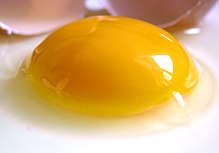
Eggs are great, but be sure to only eat the whites, because that ugly
yellow blob in the middle is teeming with cholesterol. And you don't
want high cholesterol, do you? After all, you are what you eat (in your
case, mostly bacon grease and your own words).
Ah, but the most recent evidence indicates that although egg yolk does contain most of an egg's cholesterol, foods high in dietary cholesterol have little to no effect on your blood cholesterol.
This means that egg yolks do not actually increase your risk of heart
disease. The yolks are in fact the healthiest part of the egg. They have
more of the good stuff -- phosphorus, calcium, zinc, folate, and B12
vitamins -- along with things that the white doesn't have at all,
such as vitamins A, D, E, and K. Of course, this isn't to say the white
is bad. It's just a little bland and a lot overrated. It's the Top 40
of the egg world.
Yolk
The yolk in a newly laid egg is round and firm. As the yolk ages, it absorbs water from the albumen, which increases its size and causes it to stretch and weaken the vitelline membrane (the clear casing enclosing the yolk). The resulting effect is a flattened and enlarged yolk shape. Yolk color is dependent on the diet of the hen; if the diet contains yellow/orange plant pigments known as xanthophylls, then they are deposited in the yolk, coloring it. Lutein is the most abundant pigment in egg yolk (Karadas et al.,2006). A colorless diet can produce an almost colorless yolk. Yolk color is, for example, enhanced if the diet includes products such as yellow corn and marigold petals. In the US, the use of artificial color additives is forbidden (USDA, 2011).
The yolk in a newly laid egg is round and firm. As the yolk ages, it absorbs water from the albumen, which increases its size and causes it to stretch and weaken the vitelline membrane (the clear casing enclosing the yolk). The resulting effect is a flattened and enlarged yolk shape. Yolk color is dependent on the diet of the hen; if the diet contains yellow/orange plant pigments known as xanthophylls, then they are deposited in the yolk, coloring it. Lutein is the most abundant pigment in egg yolk (Karadas et al.,2006). A colorless diet can produce an almost colorless yolk. Yolk color is, for example, enhanced if the diet includes products such as yellow corn and marigold petals. In the US, the use of artificial color additives is forbidden (USDA, 2011).

No comments:
Post a Comment